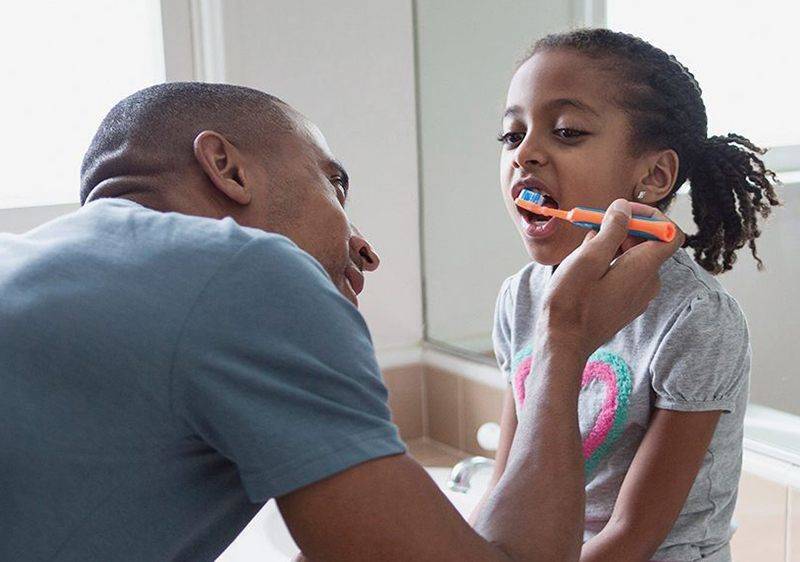Good oral hygiene helps to prevent a range of dental problems such as tooth decay, gum disease and even dental erosion. While brushing your teeth morning and night is a great start, to be really effective a little more commitment is required. Here are some easy oral hygiene tips that will help keep your pearly whites in top condition.
Correct brushing technique
As we all know, brushing your teeth at least twice a day is essential – after breakfast in the morning and before going to bed at night. Spend at least 2 minutes brushing, ensuring that all areas are cleaned – the inside, outside, and biting surfaces of each tooth. The key is to aim the toothbrush bristles directly at the gum line, rather than the top of the tooth, as this is where plaque starts to form. Gently move the toothbrush in a circular motion, which will clean away as much plaque from the gums as possible.
Manual or electric?
When it comes to choosing between a manual or electric toothbrush, it’s a personal choice – they’re equally effective at removing plaque and debris if used correctly. Both types need to be kept in tip-top condition. Over time, bristles become frayed and worn, so remember to replace the toothbrush or brush head every three months.
When choosing a manual toothbrush, make sure it has a small head for better access to the back teeth. Also, soft bristles are kinder on your gums.
A rechargeable electric toothbrush appeals to all ages and it’s a real winner for young children. While the kids are attracted to the bright colours, the electric motion of the toothbrush does the job effectively.
It’s also important to choose a toothpaste that’s fluoridated. Fluoride helps harden tooth enamel, reducing your risk of decay. Pick a low-fluoride version for children under six, using only a tiny smear (about the size of a grain of rice) when they’re under 3, increasing an amount about the size of a pea from 3-61.
Cleaning between teeth
Removing plaque between your teeth requires regular flossing at least once a day after brushing. Simply run a piece of floss (which resembles a cotton thread or string) between your teeth, using a slow, gentle sawing motion.
Nowadays, dental tape – a wide, flat ribbon of nylon that’s thinner than standard floss – has become a popular option, especially for beginners, as it’s an easier way to get between the teeth.
If you’re not quite sure how to clean between your teeth, or if you’d like help deciding on which option is best for you, get some advice from your dentist or dental hygienist.

Follow the right diet
Try to reduce or eliminate the amount of sugary food and fizzy drinks you eat and drink. It converts to acid inside your mouth and can dissolve the minerals in tooth enamel, causing decay (caries) and eventually holes (cavities). Acidic foods and drinks can also cause tooth erosion which causes tooth sensitivity, discolouration and cracks over time.
To limit the contact of acids with the teeth, eat a healthy, well-balanced diet. For example, for breakfast you could have a crunchy wholegrain cereal topped with low fat, sugar-free yoghurt and fresh fruit. Throughout the day, limit acidic drinks, such as soft drinks, sports drinks, cordials, wine and even fruit juices – in fact, it’s best to eat whole fruit rather than drinking the juice. You get more fibre and less sugar – fruit juce can contain up to 10 teaspoons of sugar! The best drinks are less acidic and include still water, milk or tea (without sugar or honey, of course).
Another way to help your body fight bacteria in your mouth is by introducing foods that promote saliva production. This includes tart or sour foods, such as limes, lemons, cherries and cranberries.
More tips for healthy teeth
After every meal, rinse out your mouth with antiseptic mouthwash to help kill germs, or at least water to wash away food debris. Another handy tip is to clean your tongue as it removes plaque that’s full of bacteria and can cause bad breath. While special plastic tongue scrapers are available at chemists, a toothbrush can be used just as effectively.
Don’t be tempted to crack nuts, rip open a plastic package or even remove a bottle top with your teeth – there’s a risk of chipping or breaking. Remember, use your teeth just for chewing food.
Visit your dentist for a check-up regularly, as often as your dentist advises; and also whenever you detect any problems, such as a toothache or bleeding gums.
Sources
1 www.dentalhealthweek.com.au/Parents/Kids/flouride
Treatments
1 You can receive 100% back on dental check-up and cleans (select dental items only) once every 6 months at Members First Ultimate Providers. Waiting periods, benefit claiming restrictions, policy and fund rules apply. Excludes orthodontics and in-hospital treatments. Available on all eligible extras products which includes General Dental (excluding FLEXtras and Your Choice Extras 60 where General Dental is not included). If you choose or require any additional dental services, any health insurance benefits will also be subject to your yearly limits.
2 You can receive 100% back on direct restorations or fillings (select dental items only), up to yearly limits, at Members First Ultimate Providers. Waiting periods, benefit claiming restrictions, policy and fund rules apply. Benefits are payable up to yearly limits or on available remaining limits in relation to your product. Some out of pocket costs may apply if a claim exceeds your yearly limits. Excludes orthodontics and in-hospital treatments. Available on all eligible extras products which includes General Dental (excluding Simple Start – Basic Plus, OSHC Extras, FLEXtras and Your Choice Extras 60 where General Dental is not included). If you choose or require any additional dental services, an out-of-pocket cost may apply.
3 Members First Ultimate Providers are not available in all areas.
ø Any surgical or invasive procedure carries risks. Before proceeding, you should seek a second opinion from an appropriately qualified health practitioner.